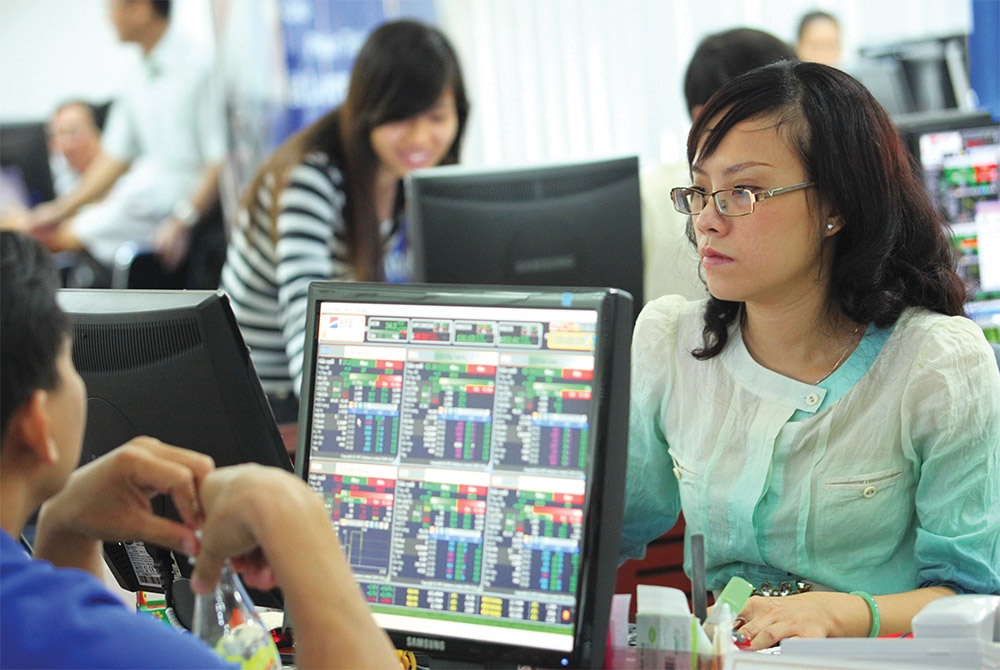November circular set to ease access for foreign investors
 |
| The new circular is tied to an anticipated market upgrade for Vietnam, photo Le Toan |
The issuance of Circular No.68/2024/TT-BTC in September offers foreign institutional investors the ability to place stock orders without requiring immediate cash collateral. Effective from November 2, the regulation is set to ease market access for foreign investors and bring Vietnam’s regulatory framework more in line with international standards.
To Tran Hoa, deputy director of the Market Development Department at the State Securities Commission of Vietnam said, “Circular 68 allows foreign investors to trade without the need for immediate full cash collateral, unlike the stringent requirements seen in developed markets where clearing houses play a central role.”
The new framework, he added, fits well within the current financial landscape of Vietnam and has garnered support from regulators, businesses, and institutional investors.
Nguyen Khac Hai, head of Legal and Compliance at SSI Securities Corporation, stressed that Circular 68 is the culmination of a decade of preparation.
“We’ve spent years laying the groundwork, and we now have the confidence to push for an upgrade. Circular 68 resolves issues regarding pre-funding for foreign investors. As it stands, Vietnam has met seven out of nine FTSE criteria and eight out of 18 MSCI criteria,” Hai noted. “This regulatory shift is expected to significantly boost Vietnam’s chances of being reclassified as an emerging market, a goal the country has long been striving to achieve.”
Pham Chieu Van, head of Institutional Client Trading at Viet Dragon Securities, pointed out that Circular 68 addresses challenges that foreign investors have historically faced, particularly in terms of interbank transfers and foreign exchange swaps.
“These issues have been a hindrance for foreign participation in the market, but the new regulation effectively resolves them. Once the pre-funding issue is fully resolved, FTSE Russell will gather feedback from foreign investors before making a final decision on Vietnam’s market classification,” Van explained.
The potential for an upgrade from frontier market to emerging market status has been a key focus for market participants. According to Mirae Asset Securities, the next review of Vietnam’s stock market by FTSE is expected in March 2025. If conditions are favourable, a formal announcement upgrading Vietnam’s status could come as early as September 2025.
An upgrade of this nature would significantly boost foreign capital inflows, as Vietnam would become more attractive to funds tracking FTSE and MSCI indices.
VNDirect Securities has projected that the implementation of Circular 68 will lead to a notable increase in foreign capital entering Vietnam’s market. “We anticipate a considerable uptick in foreign capital entering the market as these regulatory changes reduce existing barriers to investment,” VNDirect stated.
The firm expects that as more foreign investors participate, overall market liquidity will improve, benefiting not only investors but the broader market ecosystem as well.
Market liquidity is a crucial factor for Vietnam’s securities market, and the increased foreign participation driven by Circular 68 is expected to have a positive impact. VNDirect forecasts that higher liquidity will lead to improved trading conditions, enhancing the efficiency of the market and providing better opportunities for both local and foreign investors. This, in turn, is likely to result in increased brokerage revenues for securities companies as trading volumes rise.
The long-term benefits of Circular 68 are also closely tied to the anticipated market upgrade. VNDirect noted that should Vietnam achieve emerging market status, funds tracking FTSE and MSCI indices will reallocate capital into Vietnamese stocks.
“Stocks with higher weightings in these indices are expected to benefit the most from the influx of foreign capital,” the firm explained. “In particular, large-cap stocks and those with strong liquidity are expected to be the primary beneficiaries of this reallocation.”
SSI Research has also emphasised the potential for substantial inflows of foreign capital should Vietnam achieve an upgrade. According to initial estimates, an upgrade to emerging market status could result in exchange-traded fund (ETF) inflows of up to $1.6 billion, excluding capital from actively managed funds.
As SSI noted, FTSE Russell estimates that assets under active management are typically five times larger than those of ETFs, suggesting that the total inflow of foreign capital could be even more substantial.
While the outlook for Vietnam’s market is largely positive, some risks remain. VNDirect highlighted settlement risk as a potential concern. In particular, if foreign funds fail to make payments within the T+2 settlement period, securities firms may be forced to liquidate collateralised stocks, leading to selling pressure and increased market volatility.
“If foreign investors miss settlement deadlines, it may trigger forced stock sales, increasing market volatility and putting downward pressure on share prices,” VNDirect warned.
“To mitigate these risks, we suggest securities companies to strengthen their risk management systems, particularly in monitoring client creditworthiness, margin ratios, and lending conditions. While the overall risk is considered low due to the credibility of foreign institutional investors, we acknowledge that competitive pressures could heighten these risks over time as firms vie to attract more foreign clients,” the brokerage stated.
The competition among securities companies is expected to intensify following the implementation of Circular 68. Firms that offer competitive transaction fees, favourable pre-financing terms, and strong reporting and data services are likely to gain an edge in attracting foreign institutional investors.
 | More issuances approved to bolster securities capital Vietnamese securities firms are rapidly raising capital to enhance financial capacity, gearing up for market shifts and the expected upgrade to emerging market status. |
 | Vietnam securities market should soon adopt NVDR following the model of Thailand With a strong determination to be upgraded to emerging market status in 2025, Vietnam's securities market needs to improve. Nguyen The Minh, head of Research & Development for Retail Clients at Yuanta Securities Vietnam, talked to VIR’s Hazy Tran about addressing foreign ownership limits and aiming for a successful upgrade. |
What the stars mean:
★ Poor ★ ★ Promising ★★★ Good ★★★★ Very good ★★★★★ Exceptional
Related Contents
Latest News
More News
- Private capital funds as cornerstone of IFC plans (February 20, 2026 | 14:38)
- Priorities for building credibility and momentum within Vietnamese IFCs (February 20, 2026 | 14:29)
- How Hong Kong can bridge critical financial centre gaps (February 20, 2026 | 14:22)
- All global experiences useful for Vietnam’s international financial hub (February 20, 2026 | 14:16)
- Raised ties reaffirm strategic trust (February 20, 2026 | 14:06)
- Sustained growth can translate into income gains (February 19, 2026 | 18:55)
- The vision to maintain a stable monetary policy (February 19, 2026 | 08:50)
- Banking sector faces data governance hurdles in AI transition (February 19, 2026 | 08:00)
- AI leading to shift in banking roles (February 18, 2026 | 19:54)
- Digital banking enters season of transformation (February 16, 2026 | 09:00)

 Tag:
Tag:


















 Mobile Version
Mobile Version